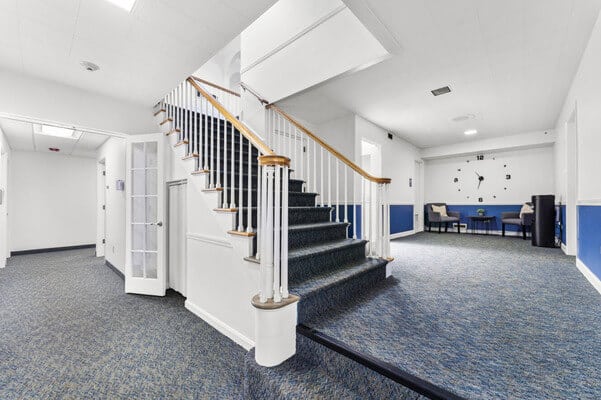Benzodiazepine Addiction
Benzodiazepines are a class of drugs that are prescribed for conditions like anxiety disorders and insomnia. They make up one of four categories of anxiolytic drugs. Benzos can also be used to treat seizures.
Because these drugs slow down the central nervous system (CNS) to help with those conditions, they come with a high abuse potential that can lead to dependence and addiction.
Learn how we address addiction to benzos in our comprehensive treatment programs at Blue Hills Recovery.
Overview of Benzodiazepine Addiction
Benzodiazepine addiction happens when people take these drugs at levels that produce a pleasurable feeling, activating the reward system in your brain. Anyone can form an addiction to benzodiazepines when taking more of the drug than is prescribed, or when abusing it in other ways. As with all forms of substance abuse, it feels good for time but can lead to disastrous effects on your mental, physical, and behavioral health.


Why Do People Form Benzodiazepine Addictions?
People form a prescription drug addiction to benzos when they associate the use of benzodiazepines with a pleasurable or rewarding feeling and begin taking them for that reason.
Benzodiazepines artificially increase dopamine, a brain chemical which can interfere with the brain’s normal reward system.
Benzodiazepine dependence doesn’t happen overnight. It can form slowly as people who take the drug begin to take higher doses repeatedly to get more from the effects of benzodiazepines.
Long-term use of this class of drugs typically leads to a higher abuse potential. People with anxiety or other mental health disorders or those who have an opioid substance use disorder are particularly vulnerable to the abuse of benzodiazepines.
What Causes Benzodiazepine Addiction?
Benzodiazepine addiction starts in the brain where this class of drug interacts with the benzodiazepine receptors in the CNS. How benzos interact with receptors in the brain is complex and not fully understood. In a nutshell, a benzodiazepine receptor is made up of five subunits that form a channel that is called a gamma-aminobutyric-acid type A (GABA-A) receptor. When benzos interact with GABA-A, they increase the frequency of the channel opening. This increase in GABA-A increases dopamine, so as benzos slow down or relax the CNS, they also increase the reward chemical of the brain. Over long-term use, people can desire the reward feeling over the function of the drug, causing addiction. At Blue Hills Recovery, we work to help people break the dependence they form on benzodiazepines and replace this feeling with natural reward feelings.
Risk Factors for Benzodiazepine Addiction
There are a number of risk factors for benzodiazepine drug abuse. People with anxiety or panic disorders are particularly vulnerable, because they can begin to associate the drug’s function (reduction in anxiety) with the increase of dopamine.
However, there are other risk factors for benzodiazepine addiction. They include:
- Use of higher doses
- Long-term use
- Combination of long-term and high-dose use
- Being in a younger age bracket
- Opioid addiction
- Growing up around substance abuse
- Trauma


Who Is Affected by Benzodiazepine Addiction?
Benzodiazepine addiction can affect anyone in any demographic. When using prescribed drugs that are on one of the five drug schedules, it’s best to use them exactly as prescribed. However, some populations are more likely to abuse benzos than others. According to Psychiatric Services, the highest rates of benzodiazepine abuse were found in adults ages 18-25. According to a survey conducted by the U.S. Department of Health and Human Services Office of Minority Health, adults of two non-Hispanic races and adults who are white had the highest and second-highest rates of benzo abuse respectively.
Benzodiazepine Addiction Signs
Benzodiazepine addiction causes negative effects on a person’s mental, physical, and behavioral well-being. Mental signs of benzo abuse include anxiety and insomnia, which are the conditions that benzodiazepines are meant to address.
Physical side effects can include:
- Nausea
- Trembling
- Headaches
- Loss of appetite
- Weakness
- Drowsiness
- Muscle spasms
Behavioral signs of benzo dependence tend to fall in line with general signs of addiction. Drug use can change how you interact with others.
It can also cause sudden changes in mood and your social circle and can lead to a decline in your performance at work or in school.
What Happens When Benzo Addiction Is Left Untreated?
The longer addiction to benzos goes on, the harder it is to stop using them. Yet people who address their addiction in the short term have better success finding sobriety.
Part of this is because of the changes to brain chemistry a benzo addiction causes. Other long-term effects are physical and behavioral.
If benzodiazepine addiction is left untreated, it can lead to the following complications:
- Your brain gets used to the unnatural input from the drug, wiring it for addiction.
- Benzodiazepine withdrawal gets more severe.
- After you get over withdrawal symptoms, cravings are more severe.
- Relationships increasingly suffer the longer an addiction goes on.
- Job or school performance continues to decline and you may have to face dismissal.
- You may experience cognitive impairment and the inability to control your emotions.
- You could experience a life-threatening overdose, including respiratory depression.
You can find compassionate, intensive addiction treatment for benzodiazepines right here at Blue Hills Recovery. We focus not only on helping you overcome benzo withdrawal and addiction, but on healing from the effects of these conditions.
Types of Benzodiazepines
There are many different types of benzodiazepines. These include short-acting, medium-acting, and long-acting.
Short-acting benzos have the highest abuse potential, because they work quickly and effectively but don’t last long. These include Nayzalam (Midazolam) and Halcion (triazolam).
Medium-acting benzodiazepines include:
- Xanax (Alprazolam)
- Ativan (Lorazepam)
- Restoril (Temazepam)
Long-acting benzos have a lower abuse potential, but are still a risk. These benzos include:
- Librium (Chlordiazepoxide
- Klonopin (Clonazepam)
- Valium (Diazepam)
There are others, such as oxazepam, but these aren’t as commonly prescribed.
There are other categories of drugs that are similar to benzodiazepines. Barbiturates are tranquilizers similar to benzos. Another category is called nonbenzodiazepines or sedative-hypnotics which include such drugs as Ambien (Zolpidem).
All of these prescription drugs have abuse potential, but benzodiazepines are the most commonly abused drugs in this category.


Benzodiazepine Addiction Treatment in Massachusetts
If you are facing benzodiazepine addiction in Massachusetts, you can find a comprehensive treatment program here at Blue Hills Recovery to help you.
Our recovery programs include detox, outpatient care, treatment for co-occurring mental health disorders, and more.
Our addiction rehab in Massachusetts aims to take you from the most intensive level of care (usually detox) to a place where you feel able to manage the responsibilities of work and school while working on your recovery.
Benzodiazepine Detox Programs
Benzodiazepine Addiction Rehab Programs
Day Treatment/Evening Treatment for Benzodiazepine Addiction
Mental Health Care for Benzodiazepine Addiction
Fight Benzodiazepine Addiction at Blue Hills Recovery
If you or a loved one are looking for help recovering from benzodiazepine addiction in Massachusetts, contact Blue Hills Recovery. We create a compassionate and caring environment to offer you evidence-based treatment that addresses everything you need to overcome addiction. It’s not easy to walk the road you are walking. That’s why we use the highest standards of care to address your individual needs, so you have the support that you deserve. If you want to know more about your treatment options, contact Blue Hills Recovery today and take control of your life.
Benzodiazepine Addiction FAQs
How do you overcome a benzodiazepine addiction?
Is benzodiazepine addiction a choice?
How long after addiction treatment does it take to rewire your brain?
Can you cure a benzodiazepine addiction?
What happens if you suddenly stop taking benzodiazepines?
Sources
Let’s talk about how we can help.
A Life of Healing Can be Yours.
You deserve to become your best self. With decades of combined experience in the field of addiction medicine, our staff knows what it takes to build a foundation for recovery.